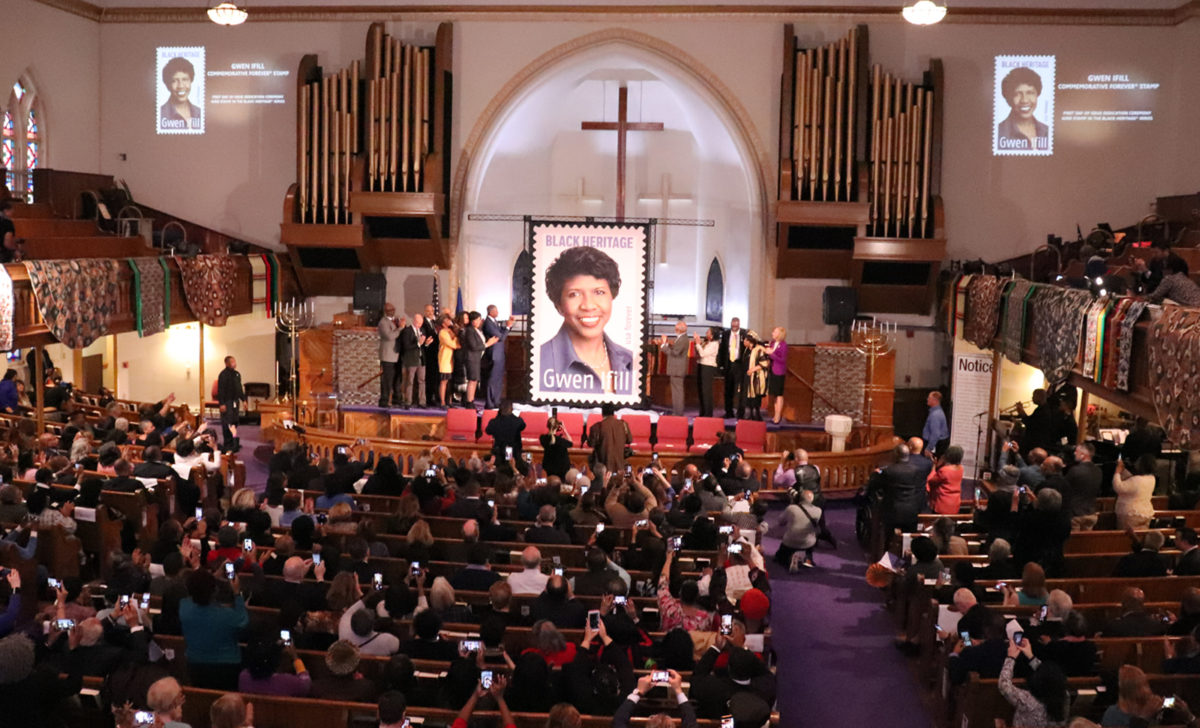By Rev. Q. Bernard Driskell, Columnist
On the pre-eve of America’s recognition of the contributions of African Americans during Black History Month, the United States Postal Service remembered the late journalist Gwen Ifill with a Black Heritage stamp at her spiritual home, Metropolitan African Methodist Episcopal Church in Washington D.C. on January 30, 2020.
Gwen Ifill is the daughter of the AME tradition, the fifth of six children of an African Methodist Episcopal ministerwho eventually became its general secretary, a post he held when he died in 1991, and her mother was active in the Women’s Missionary Society.
Ifill’s brother, Presiding Elder Earle Ifill, who retired in 2019 as the presiding elder of the church’s Atlanta East District, said it was significant to have his sister’s memory honored at an African Methodist Episcopal church, “It is delightful and meaningful in the fact that not only is it an honor for her and for us as a family but for the AME Church as a whole as she has spent her life in service to the church.”
Bishop Harry Seawright, President of the Bishop’s Council mentioned that while he did not know Gwen personally, he knows her brother, Rev. Ifill and “when she hosted the Vice Presidential Debate in 2004 and 2008 that’s when America and I fell in love with her. It was a beautiful tribute to all women especially black women.” “She was a mighty woman of God.”
The Rev. William H. Lamar IV, the pastor of Metropolitan AME Church, told the hundreds gathered for the Forever stamp ceremony, “The founders of imperial America never intended for Gwen to be Gwen,” “But the founders of the African Methodist Episcopal Church did intend for Gwen to be Gwen and for a million Gwens to follow Gwen Ifill.” “She paid her debt in full.”
Since its establishment in 1816, the AME Church has worked to minister to the needs–spiritual, physical, emotional, intellectual and environmental–of all people. Using liberation theology, the AME Church seeks to help those in need by preaching the gospel of Christ, providing food for the hungry, providing homes, encouraging those who have fallen on hard times as well as economic advancement, and providing employment opportunities to those in need. Gwen Ifill personified this mission through her life’s work both professionally and spiritually. It is noted that Ifill has a plaque on a pew at Metropolitan, connecting her roles in the press and the pew.
Mr. George Johnson, who has been as a member of Metropolitan AME for 25 years, said of Ifill, he knew her as a member of the congregation. “She was a humble person, a regular member on Sundays, but she knew how to use her power in a way that was not imposing but used her power in [society] to get things done.”
Ifill’s presence and influence was enormous as Washington D.C. Mayor Muriel Bowser issued a proclamation declaring Gwen Ifill Day in the city. Former President Bill Clinton sent a video with remarks welcoming the journalist’s recognition and hard, but fair questioning, and former Attorney General Eric Holder read a congratulatory statement from former President Barack Obama.
Gwen Ifill was indeed the heart and soul of PBS; first hosting the Washington Week in Review becoming the first African American woman to host a nationally televised U.S. public affairs/ political program; and later co-managing editor and hosting with Judy Woodruff, the PBS NewsHour; to then becoming the first African American woman to moderate a vice-presidential debate in 2004.
To echo Bishop Seawright’s comment, truly, Gwen Ifill is a model for all women. Her friend and colleague, Washington Post contributing columnist Michele Norris, who served as mistress of ceremonies recalled how Mary Williams, a Gwen Ifill fellow from Cincinnati, Ohio, said in a letter, “Seeing you on the news made me realize you did it so I can do it. You paved the way for me so I can pave the way for others.”
She was the gold standard of journalism, but she was also the golden standard of the facts, especially in a society where the truth and facts are under attack. Judy Woodruff echoed a free press is the heart of a free society and Gwen Ifill kept the heart of American society beating.
“Journalists often get a bad rap because bad news travels well,” said Judy Woodruff. However, honoring Gwen Ifill is good news because when Americans see her name and face her memory and legacy will be embedded in our hearts forever – #GwenIfillForever.
Reverend Professor Quardricos Bernard Driskell, federal lobbyist, an adjunct professor of religion and politics at The George Washington University Graduate School of Political Management, and pastor of the historic Beulah Baptist Church in Alexandria, VA. Follow him on Twitter @q_driskell4





